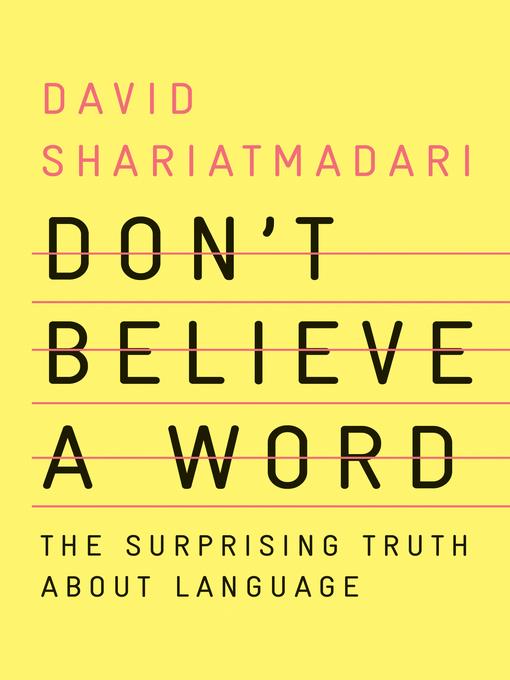
Don't Believe a Word
The Surprising Truth About Language
کتاب های مرتبط
- اطلاعات
- نقد و بررسی
- دیدگاه کاربران
نقد و بررسی

October 14, 2019
Guardian editor Shariatmadari’s mostly accessible debut about modern linguistics aims to debunk certain prevailing beliefs about language. He begins by showing the long history of an often-voiced opinion—that English is now in a state of unprecedented decline—citing a 14th-century complaint that too much Danish and French had entered the language. Shariatmadari follows up by demonstrating how commonly words change meaning (such as the verb “like”) and argues that language is “change.” Other chapters take on etymology, pronunciation, and accent. While Noam Chomsky, and his theory of a universal grammar, is one of the author’s idols, Benjamin Lee Whorf, and his hypothesis that language shapes our perception of reality, is one of his whipping boys. Shariatmadari argues at length that Whorf’s characterization of Hopi as a kind of “mysterious code” was both condescending and simply inaccurate. Shariatmadari has a gift for making obscure linguistic concepts plain, such as the function of recursion in grammar, which “means that there is no ‘longest’ sentence in a language—you can just keep adding to it,” as illustrated by the nursery rhyme “The House That Jack Built.” Shariatmadari, however, does have a tendency to belabor his points (as in his overlong discussion of dialect vs. language). Nevertheless, this is an engrossing introduction to some basic problems in contemporary linguistics.

October 15, 2019
The beauty and intrigue of language. Shariatmadari, a linguist and Guardian editor, is anxious to remove linguistics from its ivory-tower encampment and make it understandable for general readers. He cuts "through the fallacies and folklore that cloud our understanding" of this social science and provides some entertainment along the way. The author begins with the age-old myth that "language is going to the dogs." On the contrary, language is "constantly evolving....It's the speed of change, within our own short lives, that creates the illusion of decline." A history of the word "toilet" helps Shariatmadari shatter the myth that the origin of a word, its etymology, is a guide to its true meaning. How a word sounds when spoken, the "very fount of our self-expression," is largely unconscious. The shapes of our vowels and consonants, as well as accents, can change "whether you know it or not." Can animals speak? Meet Alex, an African grey parrot that could respond to complicated questions and even create a metaphorical compound. He said "rock corn" to describe dried corn. Using a specially designed board of symbols, Kanzi, a bonobo, can respond to around 3,000 words. The author also delves into where dialects come from, how to decide where a language begins and ends, and African American Vernacular English. AAVE has been branded slang or ghetto language, but using it "to help students acquire standard English actually speeds up that process." Are some languages better than others? Korean is held up by some as a "superior" language while German is a "time-honoured whipping boy." Mandarin is "slow but dense, Spanish quick but light." Shariatmadari enters into the fray over the noted linguist Noam Chomsky's controversial belief that language is instinctual. He votes no. Inquiring minds curious about epenthesis backronyms and heteronymy will find answers here. An at-times quite challenging but agile and lively introduction to language.
COPYRIGHT(2019) Kirkus Reviews, ALL RIGHTS RESERVED.

December 15, 2019
Is anything quite so familiar yet so mysterious as language? asks Shariatmadari, a writer and editor at The Guardian. His aim is to cut through the fallacies and folklore that have accumulated around the concept of language and reframe it as a fundamentally social phenomenon, rather than a genetically determined one. Each chapter leans into and deconstructs a different erroneous claim about language, providing a wealth of context without getting too bogged down in technical jargon. The chapter Language Is Going To the Dogs, for example, corrects the assertion from purists that today's linguistic standards are slipping; Italian Is a Language tackles the politics and power dynamics behind what constitutes a language; and A Word's Origin Is Its True Meaning illustrates how a word's etymology can in fact be misleading and limiting to modern usage. Shariatmadari's treatise fits into the bevy of books about modern language written for a general audience, which matches his goal of reaching not just, in his words, the nerds and pedants. A worthwhile addition to any collection.(Reprinted with permission of Booklist, copyright 2019, American Library Association.)

























دیدگاه کاربران